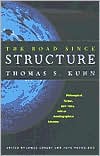Road since Structure: Philosophical Essays, 1970-1993, with an Autobiographical Interview
Search in google:
Thomas Kuhn's The Structure of Scientific Revolutions, published in 1962, is one of the most important works of our time. It has been translated into twenty five languages, and the English edition alone has sold more than one million copies. Structure established Kuhn as the century's most influential philosopher of science, but during the last twenty years of his life, Kuhn was radically rethinking the central concepts of that work. When he died in 1996, he left an unfinished sequel to Structure and a plan for a collection of essays written since 1970.Divided into three parts, The Road since Structure is the fullest record we now have of the new direction Kuhn was taking during the last two decades of his life. The first part of the book consists of essays, philosophical rather than historical in nature, in which Kuhn refines the basic concepts set forth in Structure—paradigm shifts, incommensurability, and the nature of scientific progress. In part two, Kuhn replies at length to criticisms of his earlier work. Here the reader will find Kuhn arguing his position with some of the most significant philosophers of the time, including Paul Feyerabend and Karl Popper. The third part of the volume is the transcript of a remarkable autobiographical interview with Kuhn conducted in Athens in 1995, not quite a year before his death. Here, the usually reticent Kuhn discusses his own intellectual development—his family and upbringing, his education, the influence of his training as a physicist, his war work, his relations with his colleagues, the responses to Structure—as well as his struggles to define his philosophical position both before and after that landmark work. The Road since Structure is the definitive companion to The Structure of Scientific Revolutions. Forceful and accessible, it illuminates and further develops Kuhn's classic book, and it will intrigue everyone who has been engaged by Structure and the debates it launched. In it they will find the story not only of Kuhn's development but also of the man himself. Library Journal Kuhn's title refers to his 1962 work, The Structure of Scientific Revolutions, which has become the most influential work of the last 50 years in the history and philosophy of science. The essays here have appeared in various edited works, journals, symposia, and conference proceedings, but now they are conveniently available in one volume. The essays fall into three groups, each arranged chronologically. The first shows the development of Kuhn's thought from 1980 through 1990, the second consists of his responses to criticisms of other philosophers, the last is a candid, highly interesting and informative interview Kuhn did a year before his death. Before he died in 1996, Kuhn asked his editors to omit material from a book he had been working on, which will be presented as a separate work-in-progress that is now being prepared for publication. Kuhn's work is central to the question of the relation of science and culture, but because of the technical nature of this issue, his new book will find its most appropriate place in academic collections.--Leon H. Brody, U.S. Office of Personnel Management Lib., Washington, DC Copyright 2000 Cahners Business Information.
Foreword Jehane R. KuhnEditors' IntroductionPART 1: RECONCEIVING SCIENTIFIC REVOLUTIONS1. What Are Scientific Revolutions?2. Commensurability, Comparability, Communicability3. Possible Worlds in History of Science4. The Road since Structure5. The Trouble with the Historical Philosophy of SciencePART 2: COMMENTS AND REPLIES6. Reflections on My Critics7. Theory Change as Structure Change: Comments on the Sneed Formalism8. Metaphor in Science9. Rationality and Theory Choice10. The Natural and Human Sciences11. AfterwordsPART 3: A DISCUSSION WITH THOMAS S. KUHNPublications of Thomas S. Kuhn








